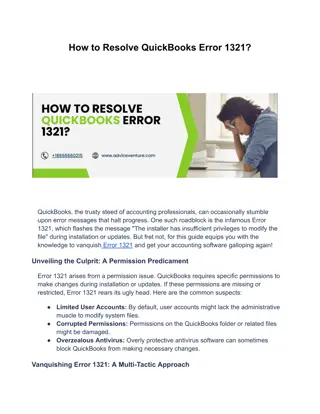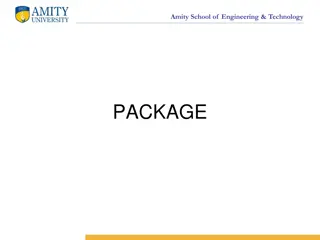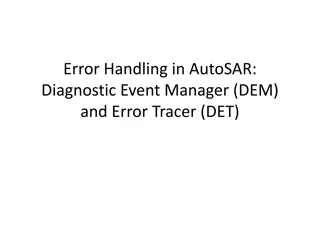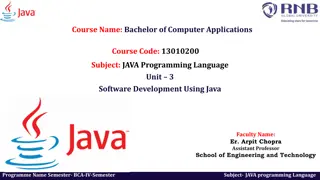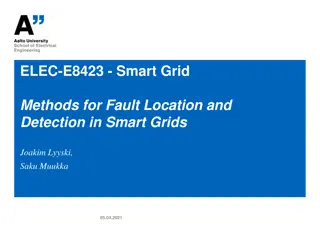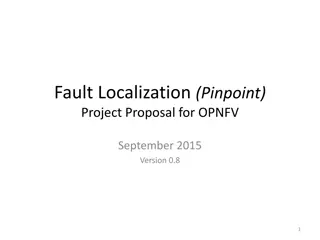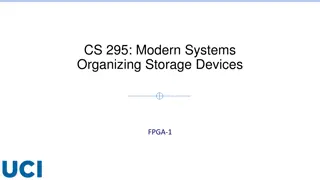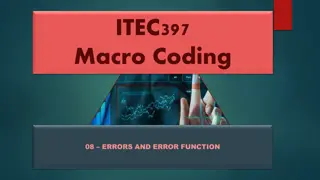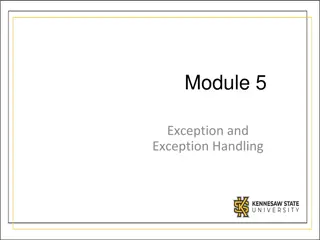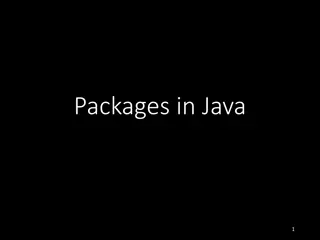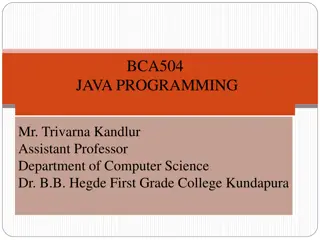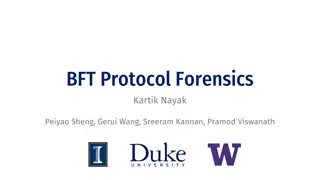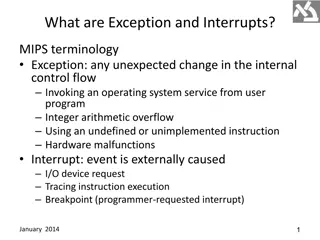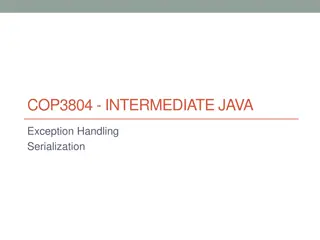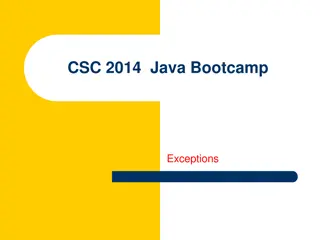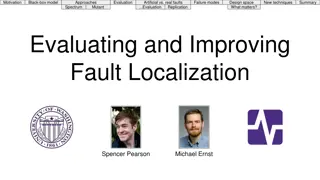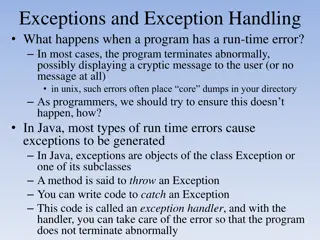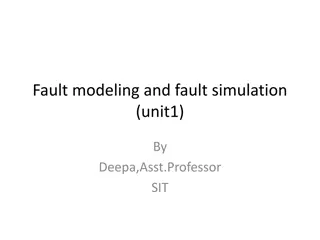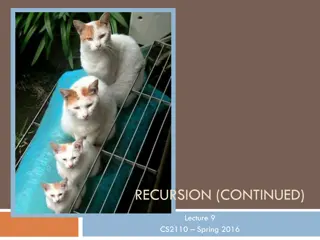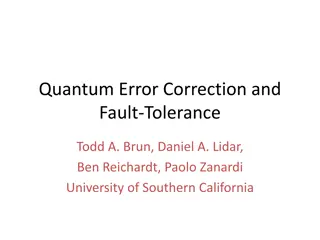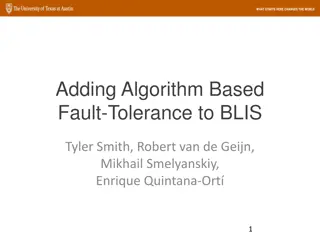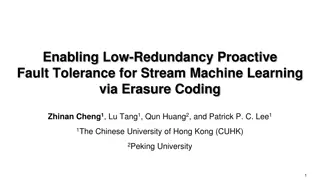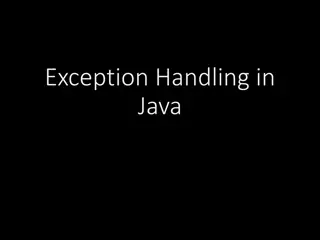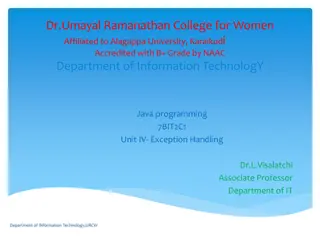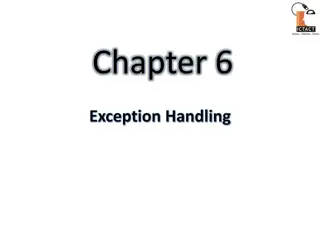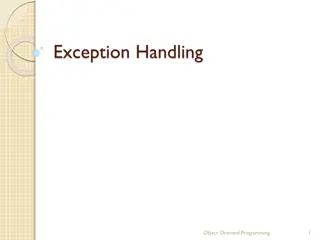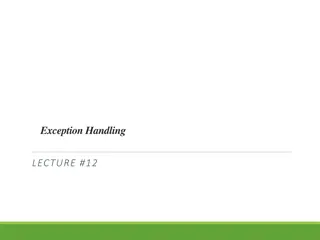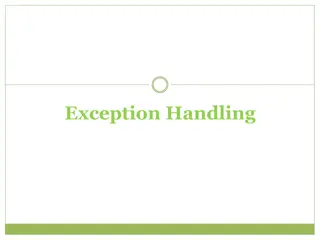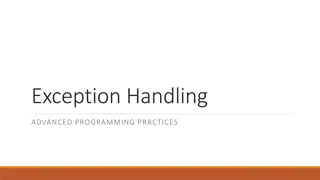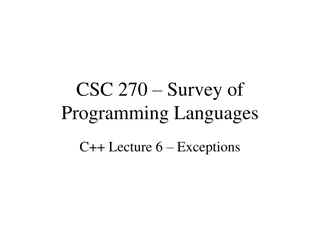Power System Fault Calculation and Protection Analysis
In this technical document, we delve into the calculation of fault current and fault apparent power in symmetrical three-phase short circuit scenarios within power systems. Through detailed equivalent circuit diagrams, reactance calculations, and per unit value derivations, the fault current and app
5 views • 15 slides
How to Resolve QuickBooks Error 1321?
How to Resolve QuickBooks Error 1321?\nStuck with QuickBooks Error 1321? Don't sweat! This error signals a permission issue. Try a simple retry first. If that fails, consider granting temporary admin rights (use with caution!). For advanced users, editing permissions or using the QBInstall tool can
0 views • 3 slides
Understanding Java Packages and Their Importance in Programming
An exploration of Java packages, their role in structuring code, organizing classes, and enhancing code reusability. Learn about built-in and user-defined packages, the Java API's package organization, and the different types of packages available in Java programming. Discover how packages help in c
2 views • 18 slides
Understanding Autoimmunity and Immunological Tolerance
Autoimmunity is a condition where the body's immune cells mistakenly attack its own tissues, leading to damage. Immunological tolerance helps prevent this by mechanisms like central and peripheral tolerance. Central tolerance involves deleting self-reactive immune cells during maturation in key orga
1 views • 32 slides
Customer Controlled SFI (CCSFI) Fault Raising Guide
This guide by British Telecommunications plc provides detailed instructions on raising a Customer Controlled Special Faults Investigation (CCSFI) fault. It covers topics such as Version Control, Best Practices for Knowledge Based Diagnostics (KBD) and CCSFI, logging in, and step-by-step guidance for
0 views • 19 slides
Effective Error Handling in AUTOSAR: DEM and DET Components
Error handling in AUTOSAR is crucial for developing reliable automotive software. The Diagnostic Event Manager (DEM) and Error Tracer (DET) are key components that manage diagnostic events, error reporting, recovery, and fault diagnosis. By providing standardized frameworks and centralized error man
0 views • 9 slides
Understanding Java Programming: BCA IV Semester Course Overview
This Bachelor of Computer Applications (BCA) course focuses on Java programming language fundamentals, object-oriented concepts, software development principles, and practical application skills. Students will learn to define Java program features, implement object-oriented features, work with array
0 views • 31 slides
Fault Location and Detection in Smart Grids
Fast and accurate fault detection and location are crucial in power grid management, especially in smart grids with bidirectional power flow. This study explores various fault location methods including impedance-based and travelling waves-based approaches. It also discusses the use of Intelligent E
0 views • 10 slides
Fault Localization (Pinpoint) Project Proposal Overview
The Fault Localization (Pinpoint) project proposal aims to pinpoint the exact source of failures within a cloud NFV networking environment by utilizing a set of algorithms and APIs. The proposal includes an overview of the fault localization process, an example scenario highlighting the need for fau
0 views • 12 slides
Understanding RAID 5 Technology: Fault Tolerance and Degraded Mode
RAID 5 is a popular technology for managing multiple storage devices within a single array, providing fault tolerance through data striping and parity blocks. This article discusses the principles of fault tolerance in RAID 5, the calculation of parity blocks, handling degraded mode in case of disk
0 views • 12 slides
Understanding Error Handling Techniques in VBA Programming
Error handling is crucial in VBA programming to catch and manage runtime errors effectively. This article explores various error handling techniques such as On Error GoTo statement to prevent program crashes and enhance the reliability of applications. By using structured error handling, developers
0 views • 17 slides
Understanding Exception Handling in Java
Exception handling in Java is essential for dealing with potential problems that may arise during program execution. By implementing try-catch-finally blocks and throwing custom exceptions, developers can create more robust and secure applications. This article explores the basics of exceptions, the
0 views • 36 slides
Understanding Packages in Java: A Comprehensive Overview
Packages in Java play a crucial role in organizing and structuring code for efficient reuse and maintenance. They allow you to group related classes together, provide encapsulation, and facilitate code organization. This article dives into the basics of Java packages, advantages they offer, differen
0 views • 19 slides
Introduction to Java Programming: Basics and Applications
Java, developed by James Gosling, is a versatile object-oriented programming language used for mobile, desktop, web applications, servers, games, and more. It is renowned for its platform independence, popularity, ease of use, security, and strong community support. This subject delves into Java fun
0 views • 15 slides
Java Overview and Basics: Understanding the Fundamentals of Java Programming
Java is a versatile programming language known for its simplicity, security, portability, and high performance. Its history dates back to 1990 when the concept was first suggested, leading to the creation of Java in 1995 by James Gosling. Over the years, Java has evolved with various versions introd
0 views • 65 slides
Overview of Java Programming Language
Java is a versatile and powerful programming language created by James Gosling and others at Sun Microsystems in the 1990s. It aims for portability, reliability, safety, simplicity, and efficiency. With a strong focus on object-oriented programming, Java has evolved over the years with a rich histor
0 views • 33 slides
Exploring Computer Programming Principles
Dive into the world of computer programming, covering high-level and machine languages, compilers, interpreters, writing programs, top-down design, and the array of programming languages available. Understand the essentials of building code to control computers, the diversity of programming language
0 views • 23 slides
Mastering Generics in Effective Java: A Practical Guide for Java Programmers
Explore the world of generics in Java through Joshua Bloch's guidance in "Effective Java". Learn the importance of avoiding raw types, leveraging parameterized types for type safety, handling mixing of generic and raw types, and implementing wildcards for flexible and typesafe coding. Enhance your J
0 views • 30 slides
Byzantine Fault Tolerance: Protocols, Forensics, and Research
Explore the realm of Byzantine fault tolerance through protocols like State Machine Replication and HotStuff, discussing safety, liveness, forensic support, and the impact of Byzantine faults. Dive into decades of research on achieving fault tolerance and examining forensic support in the face of By
0 views • 24 slides
Exception Handling and Interrupts in MIPS Architectures
Exception and interrupts in MIPS play a crucial role in handling unexpected events and external requests efficiently. Exceptions include changes in control flow, arithmetic overflows, and hardware malfunctions, while interrupts are externally caused events like I/O requests. When an exception occurs
1 views • 29 slides
Understanding Exception Handling in Intermediate Java
Exception handling is crucial in Java programming to manage errors and unexpected events that can disrupt program execution. This article covers the basics of exceptions, throwing and handling exceptions, types of exceptions (checked and unchecked), and use of try, catch, and finally blocks. Learn h
0 views • 11 slides
Exception Handling in Java: Understanding and Implementing
Exceptions are unforeseen occurrences in a program, representing errors or unusual situations. Java provides exception handling mechanisms to gracefully respond to such events. Learn about catching, ignoring, and propagating exceptions in Java to ensure reliable program execution and avoid crashes.
0 views • 22 slides
Exploring Fault Localization Techniques in Software Debugging
Various fault localization techniques in software debugging are discussed, including black-box models, spectrum evaluation, comparison of artificial and real faults, failure modes, and design considerations. The importance of effective fault localization and improving fault localization tools is hig
0 views • 24 slides
Understanding Java Exception Handling
Java provides a way to handle run-time errors through exceptions, which are objects of the class Exception or its subclasses. By using exception handlers, programmers can catch and manage exceptions to prevent abnormal termination of the program. Java's exception hierarchy includes Throwable, which
0 views • 29 slides
Comprehensive Overview of Fault Modeling and Fault Simulation in VLSI
Explore the intricacies of fault modeling and fault simulation in VLSI design, covering topics such as testing philosophy, role of testing in VLSI, technology trends affecting testing, fault types, fault equivalence, dominance, collapsing, and simulation methods. Understand the importance of testing
0 views • 59 slides
Fault-Tolerant MapReduce-MPI for HPC Clusters: Enhancing Fault Tolerance in High-Performance Computing
This research discusses the design and implementation of FT-MRMPI for HPC clusters, focusing on fault tolerance and reliability in MapReduce applications. It addresses challenges, presents the fault tolerance model, and highlights the differences in fault tolerance between MapReduce and MPI. The stu
1 views • 25 slides
Understanding Recursion in Java: CS2110 Lecture Overview
This content delves into the concept of recursion in the context of Java programming as discussed in the CS2110 Spring 2016 lecture series. It covers the basics of recursion, including base cases and how Java stack frames operate. The material also includes solutions to exception-handling problems a
0 views • 21 slides
Quantum Error Correction and Fault Tolerance Overview
Quantum error correction and fault tolerance are essential for realizing quantum computers due to the challenge of decoherence. Various approaches, including concatenated quantum error correcting codes and topological codes like the surface code, are being studied for fault-tolerant quantum computin
0 views • 19 slides
Understanding the Effects of Air Gap Tolerance on Inductance Tolerance
This technical note delves into the impact of air gap tolerance on inductance tolerance in transformer manufacturing. It explains how controlling the core's air gap dimension is crucial for maintaining desired inductance levels within manufacturing constraints. The text discusses the small scale of
1 views • 10 slides
Enhancing Fault Tolerance in BLIS with Algorithm-Based Techniques
Addressing the challenge of soft errors in supercomputers, this paper introduces algorithm-based fault tolerance methods to enhance the resilience of systems like BLIS. By integrating Application-Based Fault Tolerance (ABFT) into BLIS, the study aims to improve error detection and correction mechani
0 views • 48 slides
Low-Redundancy Proactive Fault Tolerance for Stream Machine Learning
This study focuses on enabling fault tolerance for stream machine learning through erasure coding. Fault tolerance is crucial in distributed environments due to worker failures, and existing approaches like reactive fault tolerance and proactive replication have drawbacks. The use of erasure coding
0 views • 20 slides
Exception Handling in Java
Exception handling in Java is crucial for managing errors and ensuring smooth program execution. By using try, catch, and finally blocks, developers can gracefully handle exceptions, preventing program crashes. Nested try-catch blocks and multiple catch clauses offer flexibility in handling various
0 views • 20 slides
Exception Handling in Java: Basics, Examples, and Importance
Understanding the concept of exception handling in Java, including what exceptions are, the difference between errors and exceptions, reasons for exceptions, how to handle them, and the advantages of exception handling. This topic covers the basics of handling runtime errors in Java programming and
0 views • 27 slides
Understanding Exception Handling in Java
Exception handling in Java is a crucial mechanism to manage runtime errors effectively. This article explains the concept of exceptions, advantages of using exception handling, types of exceptions (checked, unchecked, and errors), common scenarios like ArithmeticException and NullPointerException, a
0 views • 23 slides
Exception Handling in Java: Understanding Errors and Exceptions
Exception handling in Java is crucial for dealing with errors and exceptions that can occur during program execution. Errors and exceptions are conditions that disrupt the normal flow of a program, and understanding their differences is key to effective error management. This chapter covers the conc
0 views • 32 slides
Understanding Exception Handling in Object-Oriented Programming
Exception handling in object-oriented programming enables a program to manage and recover from exceptional situations during runtime errors. Java uses exceptions to represent errors, allowing methods to throw exceptions that can be caught and handled by the caller, thus separating error detection an
0 views • 21 slides
Understanding Exception Handling in C#
Exceptions in programming are runtime errors that can disrupt program execution if not handled properly. In C#, exceptions are represented by objects of the System.Exception class or its subclasses. Exception handling involves using keywords like try, catch, throw, and finally to manage errors and e
0 views • 37 slides
Understanding Exception Handling in VB.NET
Learn about exception handling in VB.NET using the built-in Exception class, Try-Catch structure, and handling different types of errors gracefully. Dive into examples and best practices for effective error management in your VB.NET programs.
0 views • 9 slides
Understanding Exception Handling in Java Programming
Exception handling in Java is a crucial mechanism to manage runtime errors effectively. This process helps maintain the normal flow of an application, separates error-handling code from regular code, propagates errors up the call stack, and groups error types. By handling exceptions, developers can
0 views • 11 slides
Overview of Exception Handling in C++ Programming
This content provides insights into exception handling in C++ programming, specifically comparing it to Java. It covers the differences in exception handling between C++ and Java, such as the absence of null pointer exceptions and divide-by-zero exceptions in C++. It explains how C++ deals with exce
0 views • 13 slides

